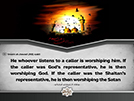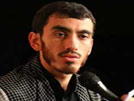Penalty for Qaâ€af
- Details
- Hits: 2374
Penalty for Qaaf
“And those who accuse free women then do not bring four witnesses, flog them, (giving) eighty lashes, and do not admit evidence from them ever.”
(Surah an-NÅ«r 24:4)
The above verse, numerous traditions and the rules promulgated by the Mujtahids indicate that every one of the false accusers of sodomy and fornication must be lashed eighty times (provided four just witnesses are not available simultaneously). However, the following conditions should be noted.
1) The sinner must be major and sane. A minor child or an insane person cannot be punished for false accusations. Also, the major and the sane person should have made the allegation after careful consideration and not under compulsion. No penalty can be imposed on an accuser if he has made a genuine mistake or if he has made the accusation in jest.
2) One who has been accused of adultery or sodomy must possess five characteristics. First of all, he must be a major. Secondly, he must be sane and not a madman. Thirdly, he must be free and not a slave. Fourthly, he must be a Muslim and not a Kafir. Lastly, he must apparently be chaste. A person who strongly objects to being blamed of adultery and fornication or is shocked and dismayed by such an accusation is taken to be a chaste person. So if the accused does not fulfill the above conditions or is notorious for being corrupt and indecent, the accuser is not penalised for qazaf.
3) The accusation should clearly mention adultery or sodomy. If an accuser is vague in his allegations and merely hints at adultery or sodomy or addresses the accused as ‘adulterer’ or ‘sodomist’, then he can be exempted from punishment. But in this case, the accused has a right to demand action against the accuser.
Sometimes, the allegation is against someone other than the one who is addressed. For example, One says, “Your father was an adulterer! Your father was a sodomist!” In such a situation, it is the right of the father, of the one who is addressed to insist upon the penalty. The son is not directly accused but insulted in the process. Consequently, he cannot demand the sentence of qazaf against the accuser but must insist upon a lighter penalty like reprimanding or beating so that the sin is not repeated.
In the same way, if someone says “bastard” or “adulterously born!’ etc., the right of having the punishment decreed rests upon the one who is actually accused. The person who is addressed can only claim a reduced penalty.











